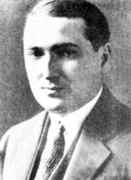Person: Post, Emil Leon

Emil Post was a Polish-born American mathematician and logician who is best known for his work on polyadic groups, recursively enumerable sets, and degrees of unsolvability, as well as for his contribution to the unsolvability of problems in combinatorial mathematics.
Mathematical Profile (Excerpt):
- After graduating from the High School Post remained on the same campus as he continued his studies at the City College.
- We now think of Post as a mathematical logician but the first subject which attracted him was astronomy.
- Although written while he was an undergraduate, Post did not submit the paper to the American Mathematical Society until 1923 and it was not finally published until 1930.
- It does contain a really important idea, for in the paper Post proves an important result about inverting the Laplace transform.
- This publication appeared long after Post's graduation with his first degree which was his B.S. awarded by the City College in 1917.
- After graduating with his first degree, Post began postgraduate research at Columbia University.
- The significant event for Post's career had been the publication of Russell and Whitehead's Principia Mathematica.
- When Post began his graduate studies it was an exciting new development and Post participated in Cassius J Keyser's seminar at Columbia which studied the Principia Mathematica.
- Post was awarded the degree of A.M. in 1918 and of Ph.D. in 1920.
- His Ph.D. thesis was on mathematical logic, and we shall discuss it further in a moment, but Post wrote a second paper as a postgraduate, which was published before his first paper, and this was a short work on the functional equation of the gamma function.
- We now turn to Post's Ph.D. thesis, in which he proved the completeness and consistency of the propositional calculus described in the Principia Mathematica by introducing the truth table method.
- The final, and perhaps the most remarkable, new idea which Post introduced in his thesis was to give a framework for systems of logic as inference systems based on a finite process of manipulation of symbols.
- Such a system of logic that Post proposed produces, in today's terminology, a recursively enumerable set of words on a finite alphabet.
- It would be fair to say that Post's thesis marks the beginning of proof theory.
- After receiving his doctorate, Post went to Princeton University for a year as Proctor Fellow.
- In 1924 Post went to Cornell but again became ill.
- Post's early death at the age of 57 was almost certainly a direct consequence of the treatment he received for his mental illness.
- Post received the electric shock treatment on a number of occasions and it was while he was in a mental institution, shortly after receiving electric shocks, that he suffered a heart attack and died.
- Post is best known for his work on polyadic groups, recursively enumerable sets, and degrees of unsolvability, as well as for his contribution to the unsolvability of problems in combinatorial mathematics.
- In the 1920s Post proved results similar to those which Gödel, Church and Turing discovered later, but he did not publish them.
- When Gödel published his Incompleteness Theorems in 1931, Post realised that he had waited too long to publish what he had proved and that now the whole credit would go to Gödel.
- In 1936 he proposed what is now known as a Post machine, a kind of automaton which predates the notion of a program which von Neumann studied in 1946.
- Post showed that the word problem for semigroups was recursively insoluble in 1947, giving the solution to a problem which had been posed by Thue in 1914.
- by four mathematicians, and one of these was Post.
- Subsequent work by Post was instrumental to the further progress of the theory of recursive functions.
- The way that Post conducted his classes at the City College was, to say the least, unusual.
- He (or rarely she) would have to face Post's "more in sorrow than anger look".
- Afterwards, Post would get out his 3 by 5 cards and explain various fine points.
- Surprisingly, these inelastic pedagogic methods were extremely successful, and Post was a very popular teacher.
Born 11 February 1897, Augustów, Russian Empire (now Poland). Died 21 April 1954, New York, USA.
View full biography at MacTutor
Tags relevant for this person:
Algebra, Group Theory, Origin Poland
Thank you to the contributors under CC BY-SA 4.0! 

- Github:
-

- non-Github:
- @J-J-O'Connor
- @E-F-Robertson
References
Adapted from other CC BY-SA 4.0 Sources:
- O’Connor, John J; Robertson, Edmund F: MacTutor History of Mathematics Archive
